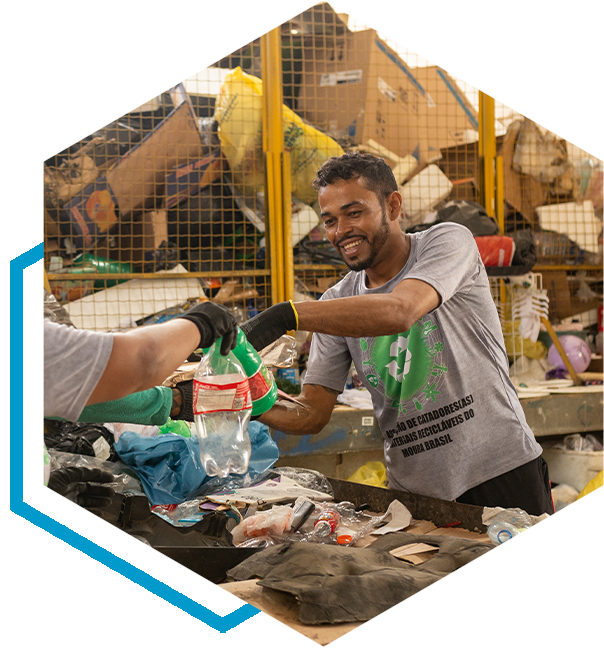Re-Ciclo
"Integrating informal workers and e-mobility for a clean city"

Other Contributors
The Fortaleza Science, Technology and Innovation Foundation (CITINOVA), in collaboration with the Municipal Department of Conservation and Public Services
Location
Fortaleza, Brazil
THE PROBLEM
Overflowing landfills, low recycling rates, poor working conditions and stigmatization of informal workers created an unsustainable, polluting and dangerous waste management system.
The Big Idea
A holistic recycling program that combines door-to-door recycling collection via e-tricycle with better wages and working conditions for waste pickers.
Life Changing Impact
Improved livelihoods for informal waste pickers, increased recycling rates and positive impacts on the city’s cycling infrastructure.
Ripple Effect
Has been scaled up to expand across the city and influence waste collection efforts in other cities and states in Brazil.
Fortaleza’s City Hall addressed the city’s low recycling rate and social inequity by leveraging the informal sector to improve working conditions, provide sustainable electric mobility and formalize waste-picking within the municipal recycling program. Re-Ciclo shows that education, investment and formalized working conditions can transform public perceptions around recycling and create a more sustainable, integrated city.
Like many other Brazilian cities, Fortaleza had a low recycling rate and lacked a structured municipal recycling program. Fortaleza’s informal waste pickers (catadores) often collected recyclables on foot by using hand-drawn carts. Waste pickers faced social stigma and earned minimal, unreliable wages.
The Fortaleza Innovation Laboratory (LABIFOR) and the city of Fortaleza developed Re-Ciclo to provide dignified working conditions for waste pickers, establish door-to-door recycling collection via electric tricycles and increase recycling rates in the community.
In 2019, the city launched the E-Catador program, formalizing waste picker association workers as municipal workers, allowing them to receive city benefits and personal protective equipment.
In 2020, LABIFOR staff held focus groups with the waste picker associations to understand their challenges. These discussions led to the establishment of new “Eco-Point” waste-collecting hubs throughout the city. In 2022, a pilot project introducing door-to-door collection via e-tricycles was introduced.
Re-Ciclo is complemented by a suite of circular economy initiatives in the Mais Fortaleza (“More Fortaleza”) program run by the city. These include a network of e-waste drop-off centers where young people receive training on e-waste refurbishment and disposal, and through which some refurbished products like computers can be donated to waste picker associations.
Re-Ciclo has scaled up rapidly from being an innovative pilot project of the city government to being managed by the city’s municipal agencies. Additional neighborhoods for recycling collection, more drop-off points, and more e-tricycles for waste pickers continue to be added.
Waste picker cycling routes and Eco-Point locations have also influenced the expansion of the city’s robust cycling network, better connecting residents to recycling centers and other amenities.
There is no prior existing relationship between the project and WRI. For full disclosure, please visit here.
By The Numbers
85% of waste pickers are women
950 tons of recycling processed
500% improvement in income for waste pickers
541% growth in citywide cycling network
90 drop-off points for residents

